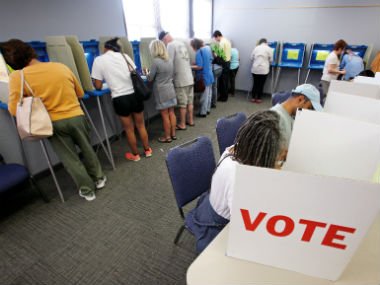As of 7 November, Democratic Presidential candidate Hillary Clinton’s number of newspaper endorsements stand at 57, while Republican Presidential candidate Donald Trump’s at around 10, that is, if you include small dailies as well, including the Crusader, the official mouthpiece of the KKK.
It’s not a surprise that so few newspapers are endorsing Trump — rather, the surprise is how even a few are endorsing Trump. Of course, with the Crusader, it’s quite obvious as to why. It’s similar to the meagre support that Trump is receiving from African-Americans: he’s reportedly polling at 2 percent, as revealed by Trevor Noah in his segment in The Daily Show. (Again, who are these mysterious 2 percenters?)
A number of media outlets expressed explicit support for Clinton, chalking up record firsts for their deed — The Atlantic made its third endorsement (first for Abraham Lincoln, and then for Barry Goldwater) since its founding in 1857, nine newspapers that supported Mitt Romney in 2012 departed from tradition to support Clinton in 2016, while those that backed Obama are yet to switch sides to Trump.

People cast their ballots for the US election at a crowded polling station as early voting begins in North Carolina. Reuters
There’s polarisation at play and Clinton is winning this round. But how important are newspaper endorsements, especially with their dwindling value, and with the rising importance of social media? And don’t forget, we’re living in an age where politics is increasingly polarised.
For one, newspapers see it as civic responsibility — helping voters (first-time and repeat) make an informed and a morally conscious choice, and who knows, it just might make a monumental difference in the election.
The BBC explains a concept called ‘crossover endorsements’ in view of the current election where a politically conservative newspaper’s refusal to endorse Trump is reasoned by the fact that he isn’t a “typical Republican candidate”. This way, they don’t seem to veer away from their editorial stance and ideology, at the same time remaining a pillar of democracy.
Two Brown University economists, Brian Knight and Chun Fang Chiang, studied whether voters are influenced by newspaper endorsements. The result was affirmative; that voters were likely to pick the recommended candidate, but the influence remained tied to the credibility of the publication. The research also took into account the newspapers’ biases — if a right-leaning or a neutral publication supported a Democrat, the readers were more likely to take the recommendation seriously.
This election involves an anomaly — Donald Trump. Given that he isn’t a traditional candidate, let alone a traditional Republican, this brings the endorsement issue into the spotlight; even if it may not swing the votes in favour of Clinton, it may create a small but significant dent.
However, newspapers aren’t the only form of media to hand out stamps of approval. Late night television shows have been increasingly moving towards that territory, perhaps beginning with Jon Stewart, who it can be said of, pioneered political commentary in the late night TV segment, interspersing it with comedy. For 16 years, Stewart dominated political satirity on TV, a mantle that has now been taken over overwhelmingly by the Englishman, John Oliver and followed by Samantha Bee, who’s currently offering the lone woman perspective.

Stephen Colbert. YouTube
While Stephen Colbert’s right-wing pundit persona on The Colbert Report was a scathing lampoon in itself, his new avatar as the host of The Late Show has him attempt a lukewarm, more neutral segment. That didn’t stop him from taking on Trump and subtly pwning (as the gamers say) him on the show. Runner-up Seth Meyers, who moved from SNL’s Weekend Update to hosting NBC’s Late Night, has been moving the show from celebrity interviews to political analysis talking about the debates and the candidates’ “scandals”. The rest — Jimmy Kimmel, Jimmy Fallon, James Corden and Conan O’Brien — are perhaps best left out of the race.
Trevor Noah, the successor of Jon Stewart, has been adequately funny trying to fill in the latter’s shoes — but he faces some challenges. For one, the South African comedian was born to a white and Swiss-German father, and black, Xhosa and half-Jewish mother; a man of mixed-race origin trying to come up in a largely white man’s game. Two, being a native of South Africa means that Noah is an outsider trying to lean in. Three, as a black anchor, he has to carry an enormous burden of not just representing his community, but to also not let them down, lest his appointment is written off as a diversity hire.
It’s not a surprise that so few newspapers are endorsing Trump — rather, the surprise is how even a few are endorsing Trump.
There is one thing they all have in common though — directly or subliminally, the hosts are helping shape a case for Clinton, or rather against Trump. They have their biases against Clinton: none of them agree she is the perfect ideal candidate (for that matter no one is or can be). Colbert ran a segment on how untrustworthy she is (“You are so untrustworthy that Beyonce is working on a concept album about you!”), Oliver took her on as well (“not being as bad as Donald Trump is a low bar to clear”), Noah made fun of her robot-like demeanour (“Morgan Freeman, perfect choice. Who better than to humanise Hillary Clinton than the man who made us fall in love with penguins?”) and Jon Stewart in an interview voiced his misgivings about her (“A very bright woman without the courage of her convictions”).
But they stand united against Trump.
Late night programmes aside, shows like SNL and Amy Schumer’s standup comedy, for instance, have taken on the mandate of political polarisation, unmindful of the backlash later. Schumer’s Florida show saw about 200 people walk out of the venue after she made fun of Trump with a host names including “orange, sexual-assaulting, fake-college-starting monster”.
SNL, while also asking Trump to host an episode last year that caused people to protest and accuse the show of losing its ‘credibility’, stopped going soft on him by breaking out a number of sketches parodying the Republican candidate, the most successful of which have had Alec Baldwin playing him. (Sidebar: This is perhaps the only way Trump might win an Emmy — through proxy.) This portrayal even angered Trump, causing him to call it “unfunny” and a “hit job” on him.
Trump’s anger at the portrayal was because of two reasons. One, that he didn’t expect a primarily sketch comedy show to have an opinion on politics. Of course, that’s impossible given that SNL has always been most critical of its country’s race for the top job. Entertainment and politics have been constant bedfellows — America is no different from India, you have to look no further than the JFK-Sinatra relationship, glamourised further by Marilyn Monroe. Or Chevy Chase’s portrayal of bumbling Gerald Ford, which made the leader relatable and likeable to the American public. The other reason is that late night shows with a liberal bent are expected to make fun of a presidential candidate, especially a right-winged, racist, xenophobic one — criticism from them is something Trump expects and given that he makes up more than half the news cycle, it’s unavoidable.
That way, American television shows have been constantly shaping or trying to shape public opinion. And it’s no different in 2016.
[Source:-Firstpost]



